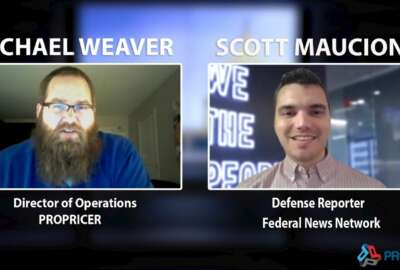Hubbard Radio Washington DC, LLC. All rights reserved. This website is not intended for users located within the European Economic Area.
On Air: Federal News Network
Trending:
More DoD contracting dollars are going to shrinking pool of small businesses
The Defense Department has been steadily increasing the number of contracting dollars it directs to small business.
Best listening experience is on Chrome, Firefox or Safari. Subscribe to Federal Drive’s daily audio interviews on Apple Podcasts or PodcastOne.
The Defense Department has been steadily increasing the number of contracting dollars it directs to small business. But the number of small businesses it works with is dropping. For the Government Accountability Office, that indicates a need to better coordinate the department’s many efforts to promote small business. The Federal Drive with Tom Temin got more from the GAO’s director of financial markets and community investment issues, Bill Shear.
Interview transcript:
Tom Temin: Bill, good to have you back.
Bill Shear: Thank you for having me, Tom.
Tom Temin: And in this report, you found that they basically do a good job, but that there’s something disquieting about the fact that more and more small business dollars are going to a smaller roster of small businesses. Tell us what you found and what your interpretation was.
Bill Shear: There are a number of reasons why there’s been an increase in dollars to small businesses in terms of the procurement dollars at the Department of Defense, and why there’s been a decline in businesses. It’s a trend that’s been present for a number of years involving Department of Defense and other in other agencies. But focusing on the Department of Defense, one of the mechanisms that’s often associated with a decline in businesses is category management, which creates certain vehicles where there’s called best in class contracts. And that actually limits not only the number of competing small businesses, it limits the number of competing large businesses because you have more of a unified structure for making acquisitions. So this is something that’s common, and it’s part of the Department of Defense. So this is one of the things we observed. But part of what we are examining here is something that is broader than that, which is how can small businesses be better included for serving the needs of the Department of Defense and the industrial Defense base. So basically what the objective is to try to bring these various mechanisms within the Department of Defense to try to better integrate small businesses into their strategy.
Tom Temin: Well, could this be happening? The number of businesses is dropping because of category management, as you say, but that tends to cover commodities — but in the case of defense industrial base for specific, say, platforms, you might outsource the construction of a spindle for a gyroscope to a small business machine shopper, that type of thing. I’m making that one up. Could it be that the number of real defense industrial base core small businesses is not declining, but the overall decline is because of category management for commodity type products like office equipment?
Bill Shear: Category management is that the only reason for the decline. Part of it is the complexities of doing business with the Department of Defense. So for example, we interviewed a number of small businesses that are involved in this space, especially those that are involved in more in technology type activities. And what they’ve said is that over time, that it has gotten more complicated to meet the requirements of the Department of Defense, and that in many cases, these more technologically based companies can find it easier to do business with the private sector. So there’s things other than category management that affect this decline. And let me just take as an example, now we have new, Department of Defense has new requirements for cybersecurity. And there’s obviously very good reasons for having requirements for cybersecurity. But it is something else that increases the cost of many small businesses of doing business with the Department of Defense. So I wouldn’t want to focus just on category management, but it would be that there’s a number of aspects of doing business with the Department of Defense that can limit the number of small businesses that are active in this procurement.
Tom Temin: We’re speaking with Bill Shear, he’s director of financial markets and community investment issues at the Government Accountability Office. And so the cybersecurity requirements is a lay on because when you say it’s getting more difficult to do business with the Defense Department, at least that’s the perception of these businesses, the small businesses, what else has changed? Because the defense supplement to the Federal Acquisition Regulation hasn’t changed all that much. In fact, they’re using other transaction authority even more, which should make it easier for small businesses. So what else might be going on do you think?
Bill Shear: I would still focus on two major things being category management and some of the requirements. The FAR requirements have not changed, but just I think the use of, it’s not just category management, but that there are other aspects of how contracting is conducted. Even if there hasn’t been changes in the FAR, that make it more complicated to do business with the Department of Defense. The one that I can point to, that’s kind of like a good illustration has to do with cybersecurity.
Tom Temin: The essence of your report, though, is that DoD needs to better coordinate, I guess, what are scattered efforts across the department concerning small business. And there’s a lot of places that have to do with small business, because the Pentagon is a very big and complicated place.
Bill Shear: The Department of Defense, as you say Tom, is a very complex and large organization. You have a lot of entities involved in procurement, and involved in procurement that is focused on small business. And in particular, I’ll draw attention to there’s an Office of Small Business Programs, one office that reports to the Secretary of Defense, and then the components also have their own office as a small business programs. And they’re all involved in trying to reach out doing matchmaking events and reaching out to try to get small businesses to participate in federal procurement with the Department of Defense. So you have these activities going on, but they’re kind of disjointed. And Congress had mandated the Department of Defense a number of years ago to come up with a strategy for the inclusion of small business. And there was a strategy that came out of the Department of Defense in 2019, but it didn’t really have specific mechanism for getting all these various entities involved. So the objectives of the small business strategy were, one, was implementing a unified management structure, because of all the various entities involved in serving the department and the defense needs of the department, in terms of strengthening the defense industrial base, so there had to be a unified management structure. The second was aligning DoD small business activities with national security priorities. So that was the second. The idea is that it’s not just including small businesses, which involves counting dollars towards certain goals that are part of the Small Business Act provisions, it isn’t just reaching out and trying to increase small business activity, it’s actually trying to use small businesses to better serve national security priorities.
Tom Temin: And the third objective?
Bill Shear: And so then the third objective is to strengthen DoD’s ability to support the warfighter and serve small businesses at the same time. So it’s trying to bring together all these different activities into a more unified or coherent structure, where you have collaboration and monitoring that goes on and create some consistency in trying to use small businesses, and to try to use in particular small businesses that are more involved in innovation into the procurement activities at the Department of Defense. So this is largely what we focused on in our evaluation of DoD
Tom Temin: And looking at the fact that the different components all have their small business programs, that could be a big clue there. Because to a small business, if doing business is slightly different between the Navy, the Air Force and the Army, and now Space Command or whatever, all these different components, and whatever might be coming from the fourth estate, then that would really make it complicated, even if there isn’t uniform DFAR, these variations among the components.
Bill Shear: And that’s exactly part of the point. So there’s a lot of activity going on to increase the contract dollars going to small businesses, but the idea is that there isn’t something that’s unifying this effort to try to really integrate small businesses into the overall strategy and aligning the strategy with national security priorities.
Tom Temin: So the plan is laid out, they’ve stated it and you’ve reiterated it. Where are they falling short?
Bill Shear: There’s a lack of a plan for implementing the small business strategy. So there’s a strategy that’s begging for a plan to implement it. And what we found is that the lead entity here is the Office of Small Business Programs that reports to the Secretary. And that office went over a number of years from about 13 staff members down to four. And you had a lot of turnover at the director level of that office. And so there wasn’t consistent leadership. So it’s a staffing and resources type of issue and a leadership issue in that office. Another thing that created a problem in coming up with a plan to implement the strategy was just the impacts of the pandemic. It’s just harder to manage all these different components and these different offices within DoD in a virtual environment. So those were among the things that contributed to the inability to come up with a plan for implementing the strategy.
Tom Temin: All right, then I guess we can infer what your recommendations were.
Bill Shear: The recommendations are pretty straightforward based on that. So the first recommendation was that the director of the Office of Small Business Programs should develop and submit an implementation plan for DoD small business strategy. So it has now been made a requirement where now there is a statutory requirement that reinforces this recommendation we made. The second recommendation is that director of the DOD’s Office of Small Business Programs should develop a policy to guide the implementation of a unified management structure as part of this small business strategy. So it is trying to just come up with how do you create this unified management structure, and get it all collaborating and coordinating with each other. And then the third is, again, the director of DoD Office of Small Business Programs should establish a formal process or monitoring and reporting on DoD’s progress in implementing this small business strategy, because this is a good practice whenever you’re setting up a strategy, which is to kind of come up with timelines. And many times people refer to something as simple as project plans for how you bring it about. So these are really, they’re pretty basic and straightforward recommendations to address what is really needed to successfully implement this small business strategy.
Tom Temin: And DoD leadership generally agreed with you?
Bill Shear: Yes, there is agreement. We’ve really established, I think, a very constructive relationship with the director who’s come in with the current administration, the director of the Office of Small Business Programs, and he’s certainly trying very hard to create an environment where these recommendations can be implemented.
Tom Temin: Bill Shear is director of financial markets and community investment issues at the Government Accountability Office. Thanks so much.
Bill Shear: Okay, thank you, Tom. It’s been a pleasure.
Copyright © 2024 Federal News Network. All rights reserved. This website is not intended for users located within the European Economic Area.
Tom Temin
Tom Temin is host of the Federal Drive and has been providing insight on federal technology and management issues for more than 30 years.
Follow @tteminWFED
Related Stories
JAIC thinks AI might solve DoD’s struggles with contract writing systems
On DoD

WEDNESDAYS, 11 A.M. & 2 P.M.
Each week, Defense Reporter Jared Serbu speaks with the managers of the federal government's largest department. Subscribe on PodcastOne or Apple Podcasts.
Related Stories
-
How small businesses can price themselves right for DoD contracts Federal Insights
-
JAIC thinks AI might solve DoD’s struggles with contract writing systems DoD Reporter's Notebook





